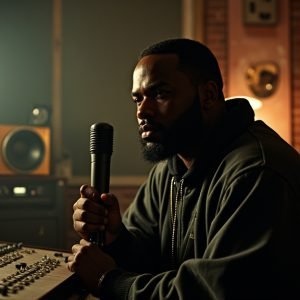In the annals of hip hop history, few moments are as starkly etched or as frequently revisited as the 1995 Source Awards. It was a night intended to celebrate the genre’s burgeoning influence and undeniable artistry, yet it became a crucible for one of its most innovative duos. Big Boi, one half of the iconic Atlanta-based group Outkast, has recently offered a profound reflection on that infamous evening, revealing how a wave of unexpected negativity ultimately served as a powerful catalyst, propelling them to lean harder into their distinctive sound and create some of the most impactful music of their generation.
The Unforgettable Night: A Baptism by Boos
It was a critical juncture for the burgeoning Southern hip hop scene. New York and Los Angeles had long dominated the mainstream narratives, but a new force was rising from the South. When the envelope was opened for the coveted Best New Artist award at the 1995 Source Awards, the tension in the room was palpable. Outkast, the vibrant, genre-bending duo from Atlanta, was announced as the winner, triumphing over the Cleveland-based powerhouse, Thugs-n-Harmony. What followed was not the celebratory applause typically afforded to a rising star, but a jarring symphony of boos from a significant portion of the crowd. The collective disdain was unmistakable, a direct challenge to their legitimacy in a scene often fragmented by regional loyalties.
Big Boi, recalling the raw emotion of the moment, has since described it as a pivotal, almost spiritual, experience. While many artists might have recoiled from such an overtly hostile reception on a national stage, Outkast, with their unwavering commitment to artistic integrity, chose a different path. The boos weren’t a deterrent; they were a declaration. They were an external validation of their unique stance, confirming that they were indeed pushing boundaries and challenging established norms. This public rejection, paradoxically, fortified their resolve.
Fueling the Fire: The Birth of a More Impactful Sound
Instead of succumbing to the pressure to conform, the negativity received that night at the Source Awards galvanized Big Boi and André 3000. It wasn’t just a minor setback; it was a fundamental shift in their approach. Big Boi stated unequivocally that this incident fueled them, not with anger, but with an intense determination to create even more impactful music. The boos served as a potent reminder that their vision was distinct, and that distinctness was worth defending and amplifying. They recognized that their sound, deeply rooted in the Southern experience while simultaneously pushing experimental boundaries, was destined to be polarizing to some, and revolutionary to others.
This newfound conviction manifested in their subsequent work, leading to critically acclaimed albums that defied easy categorization and expanded the very definition of hip hop. Their albums became more adventurous, their lyrics more introspective, and their production more elaborate. The booing incident became a testament to their independent spirit, signaling to the world that Outkast would not bend to external pressures. This commitment to their authentic artistic voice would define their legendary trajectory within the music industry.
A Vision of Unity: The Unreleased Tupac Collaboration
Adding another layer of historical intrigue to Outkast’s journey, Big Boi also recently reflected on a past conversation he shared with the late Tupac Shakur. This revelation underscores Outkast’s significant standing even among their contemporaries, including one of hip hop’s most revered figures. According to Big Boi, Tupac, known for his prolific output and passionate artistry, expressed a genuine interest in collaborating with Outkast. This proposed collaboration was not just for a single track, but for a more ambitious project: Tupac’s unreleased ‘One Nation’ album.
‘One Nation’ was envisioned by Tupac as a groundbreaking effort to unite artists from different coasts and backgrounds, transcending the bitter East Coast-West Coast rivalry that was tragically consuming the rap world at the time. Tupac’s interest in Outkast for such a crucial project speaks volumes about their reputation as innovators and bridge-builders, even then. It highlights that beyond the regional skirmishes, there was an underlying respect for pure talent and artistic integrity. While the ‘One Nation’ album never saw the light of day in its intended form due to Tupac’s untimely death, the mere fact of his expressed desire to work with Outkast emphasizes their unique position in the evolving landscape of hip hop and American music.
The Enduring Legacy of Defiance and Innovation
The 1995 Source Awards, initially a moment of public humiliation for some, transformed into a foundational event for Outkast. It solidified their identity as uncompromising artists who thrived on challenging the status quo. Coupled with insights like Tupac’s vision for ‘One Nation’, it paints a picture of a duo that was always at the vanguard, not just reacting to the news, but shaping it. Big Boi’s recent reflections underscore how these formative experiences, from facing down a hostile crowd to engaging with a legend’s unifying vision, were instrumental in shaping Outkast’s distinctive sound and profound lyrical depth.
Outkast went on to become one of the most critically acclaimed and commercially successful groups in music history, consistently pushing the boundaries of the hip hop genre. Their journey serves as a powerful reminder that true artistry often blossoms in the face of adversity, and that the courage to remain authentic, even when booed off a national stage, can be the very ingredient that propels an artist towards legendary status. The echoes of those 1995 boos, far from silencing them, instead served as an accelerant, burning bright as Outkast cemented their place as undisputed pioneers in the ever-evolving world of hip hop.
























